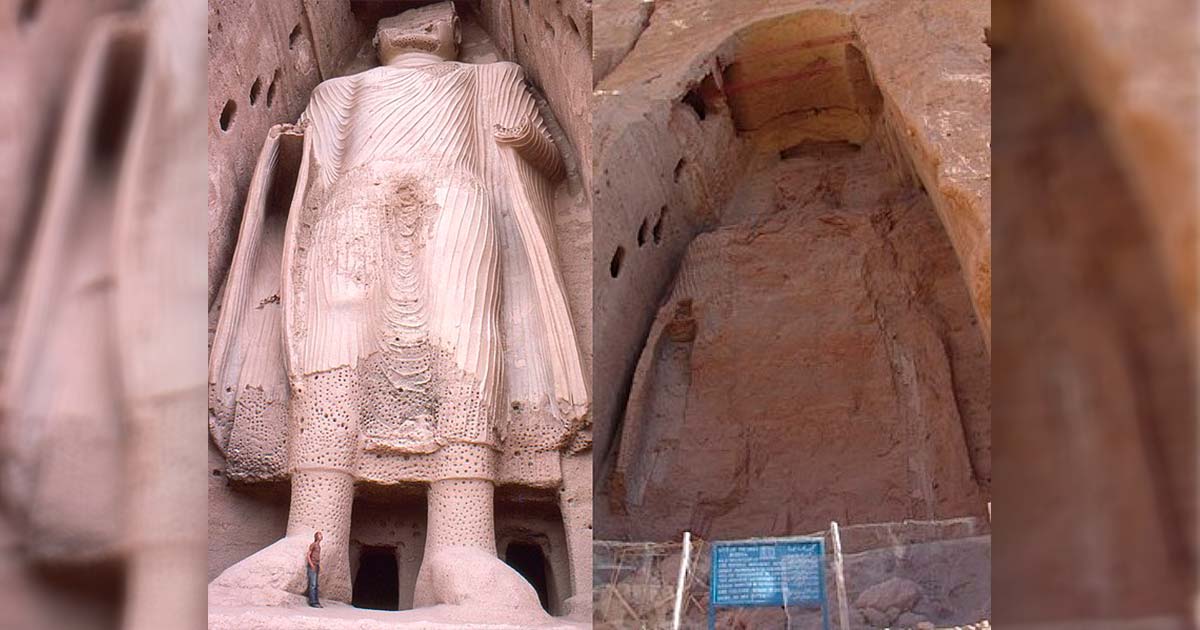Twisted Tourism: Taliban Sells Tickets to See the Buddhas They Blew Up
The Taliban are not known as being guardians of history, and for the last 20 years they have embarked on a quest to “honor” the artifacts of antiquity with sledge hammers and bombs. After turning archaeological sites into avant-garde installations of shattered dreams, the Taliban are now selling tickets to visit the ancient monuments that they demolished in 2001, in an attempt to boost Afghanistan's flagging economy.
The Washington Post reported that Afghanistan’s tourist plan includes a pair of 1,400-year-old giant stone Buddhas that they turned to rubble in 2001, “in a purge of non-Islamic art.”

The cash-strapped Taliban is selling tickets for tourists to visit a heritage site it destroyed - the Bamiyan Buddhas. Source: Torsten Pursche / Adobe Stock
The Pummeling of Afghanistan
During his tenure, former President Trump played a significant role in the efforts to hinder the Taliban's activities in Afghanistan. Through diplomatic negotiations he sought to bring about a peaceful resolution to the enduring conflict. However, achieving lasting peace and stability requires sustained efforts from various stakeholders, and not adhering to these principles, on August 21, 2021, President Biden withdrew all troops from Afghanistan, marking a significant shift in the country's dynamics and geopolitical landscape.
- History Erased: The 6 Most Heartbreaking Archaeological Destructions
- World Heritage Committee halts reconstruction of ancient Bamiyan Buddhas
Afghanistan's economy has faced numerous challenges, including decades of conflict, political instability, and limited infrastructure. The absence of sustained development, weak, corrupt, and self-serving institutions, and dependency on foreign aid, are all factors limiting the country from achieving robust economic growth and stability. In fact, the country’s economy has faltered so much in the last decade, it is now marketing destroyed archaeology to tourists.
A Day Out to See a Broken Buddha? Maybe Not
The Bamiyan Buddhas, located in the Hazarajat region of Afghanistan, were once majestic symbols of Buddhist art and heritage. They were built around 600 AD, and stood at 53.34 meters (175 ft) and 36.56 meters (120 ft) tall. Shockingly, in March 2001 NBC reported that both statues were destroyed by the Taliban, instantly erasing 1,400 years of Afghanistan's rich cultural history.
Slate reported that over two days the Taliban fired “anti-tank mines, anti-aircraft guns, [and] artillery” at the two statues. Furthermore, after the barrage, they planted explosives behind the statues and blasted them to rubble. However, now, locals are being offered tickets to visit the ‘broken’ Bamiyan Buddhas, for “57 cents and $3.45 to foreigners,” The Post reported.
Greed, Corruption and Sexism
Afghanistan still faces serious challenges for women's rights, with historical periods of oppression and restrictions on their freedom returning to haunt society today. Under Taliban rule, one of the most horrific laws imposed on Afghan women was the complete restriction on their education and employment opportunities, effectively denying them access to basic rights, to maintain systemic gender inequality.

Activists protest against the Taliban on April 28, 1998 in Peshawar, Pakistan. (RAWA)
Notwithstanding, in 2022, around 200,000 tourists visited the crumbled Buddhas. Local official Saifurrahman Mohammadi told The Post that since the Taliban's return to power in 2021 the country's finances “have plummeted.” However, it is reported that Afghan officials believe such sites have potential “to bring in significant tourist money.” And with destroyed ancient sites serving as infrastructure hubs, Mohammedi said he is planning to build a souvenir market nearby, the Washington Post reported.
- Could There be a Third Bamiyan Buddha, Hidden for Centuries?
- Going Where Archaeologists Cannot, Spy Satellites Reveal Thousands of Forgotten Ancient Sites in Afghanistan
No Matter How You Look at This, It’s Whack
Is it just me, or is touting tickets to destroyed archaeological sites a bit like charging admission to a theatre performance where the stage is ruined and the actors have fled, providing a desolate and sad scene, devoid of its historical charm and religious significance? Now imagine it was the person who wrecked the theatre that’s selling the tickets to see his ruined show.
Put another way, selling tickets to destroyed archaeological structures is like opening a high-end restaurant that boasts a decadent menu, but serves only empty plates. The point here is that while visitors, mostly Afghani, are paying for an experience that promises cultural richness, they are confronted with the bleak remnants of destroyed heritage.
The tourist takeaway? No matter what they might tell you, I bet most visitors leave with a bitter taste of disappointment, and perhaps resentment for the terrorists behind this tragedy.
Top Image: Smaller Buddha of Bamiyan, before and after destruction. (Minahatithan / CC BY-SA 4.0)
By Ashley Cowie

















